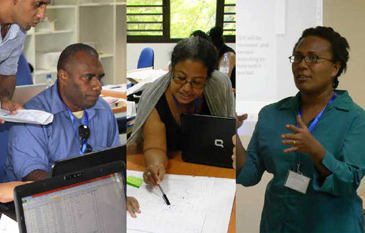Public health surveillance and laboratory professionals from American Samoa, Cook Islands, Nauru, Niue, Tuvalu and Vanuatu came together in Noumea, New Caledonia, last week to participate in the first module of an accredited data for decision-making (DDM) training programme.
The DDM training, which is delivered by experts from the Secretariat of the Pacific Community (SPC) together with experts from several partners of the Pacific Public Health Surveillance Network (PPHSN), is designed to build the skills of public health workers to improve surveillance and health information systems in the Pacific Islands.
“Since August 2013, 118 health workers from 13 Pacific Island countries and territories have completed the first module of the training, and the results and feedback from participants are very encouraging”, says Dr Adam Roth, Surveillance and Operational Research Team Leader at SPC.
Palolo Iloni, Hospital Nurse in Tuvalu, who attended the course in Noumea, said, “I am glad because I understand better now how to use data and interpret graphs, and this will really help me for my surveillance work back at home.”
Accredited by Fiji National University, the training programme consists of four modules on data analysis, epidemiology, public health surveillance and disease outbreak response. It is suitable for professionals working with a variety of data on both communicable and non-communicable diseases.
“This training is important in our line of work as it gives us the knowledge to analyse our data to inform decision-making, said Mr Tebikau Tibwe, Chief Health Inspector from Kiribati, who attended a Module 1 course in 2013 and a Module 2 course two weeks ago in Kiribati.
“The participants take the training seriously, as the course credits are recognised, unlike many short-term training courses.”
DDM Module 2 has been organised twice this year - in Palau and Kiribati - and DDM Module 3 will be delivered in Guam next week with participants from Palau, Northern Mariana Islands, Guam, Federated States of Micronesia and Marshall Islands.
The success of this large-scale training programme can be attributed to the engagement and collaboration of many partners of PPHSN: ministries of health of the Pacific Island countries and territories, the Pacific Island Health Officers Association, Hunter New England Local Health District in Australia, Fiji National University, the US Centers for Disease Control and Prevention, the World Health Organization, the University of Queensland, the University of Newcastle and SPC. This is made possible by the financial support of the Australian Aid funded Response and Analysis for Pacific Infectious Diseases (RAPID) project, the New Zealand Aid Programme, the European Union Global Climate Change Alliance: Pacific Small Island States (GCCA: PSIS) project, the Australian Aid funded International Climate Change Adaptation Initiative, the US Centers for Disease Control and Prevention and the French Pacific Fund.




